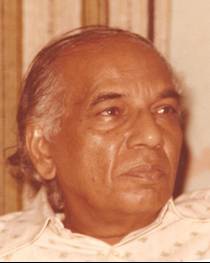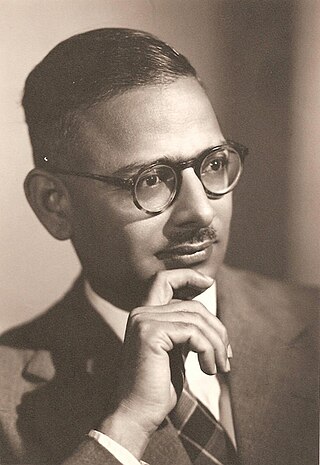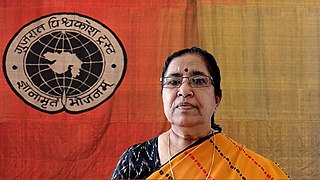Related Research Articles

K. Satchidanandan is an Indian poet and critic, writing in Malayalam and English. A pioneer of modern poetry in Malayalam, a bilingual literary critic, playwright, editor, columnist and translator, he is the former editor of Indian Literature journal and the former secretary of Sahitya Akademi. He is also social advocate for secular anti-caste views, supporting causes like environment, human rights and free software and is a well known speaker on issues concerning contemporary Indian literature. He is the festival director of Kerala Literature Festival.
Anita Desai, born Anita Mazumdar, is an Indian novelist and the Emerita John E. Burchard Professor of Humanities at the Massachusetts Institute of Technology. As a writer she has been shortlisted for the Booker Prize three times. She received a Sahitya Akademi Award in 1978 for her novel Fire on the Mountain, from the Sahitya Akademi, India's National Academy of Letters. She won the British Guardian Prize for The Village by the Sea (1983). Her other works include The Peacock, Voices in the City, Fire on the Mountain and an anthology of short stories, Games at Twilight. She is on the advisory board of the Lalit Kala Akademi and a Fellow of the Royal Society of Literature, London.
Ralph Russell SI was a British scholar of Urdu literature and a Communist.

The Sahitya Akademi Award is a literary honour in India, which the Sahitya Akademi, India's National Academy of Letters, annually confers on writers of the most outstanding books of literary merit published in any of the 22 languages of the 8th Schedule to the Indian constitution as well as in English and Rajasthani language.

Abdur Rehman Rahi was an Kashmiri poet, translator and critic. He was awarded the Indian Sahitya Akademi Award in 1961 for his poetry collection Nawroz-i-Saba, the Padma Shri in 2000, and India's highest literary award, the Jnanpith Award in 2007. He is the first Kashmiri writer to be awarded the Jnanpith, India's highest literary award for his poetic collection Siyah Rood Jaeren Manz. He was honoured with Sahitya Akademi Fellowship in 2000 by Sahitya Akademi, New Delhi.

Gopi Chand Narang was an Indian theorist, literary critic, and scholar who wrote in Urdu and English. His Urdu literary criticism incorporated a range of modern theoretical frameworks including stylistics, structuralism, post-structuralism, and Eastern poetics.

Syed Ali Jawad Zaidi was an Indian Urdu poet, scholar, and author of over 80 books in several languages. He was also an Indian independence activist, lawyer and later, a civil servant, but is best known for his work in Urdu literature.

Krishna Sobti was an Indian Hindi-language fiction writer and essayist. She won the Sahitya Akademi Award in 1980 for her novel Zindaginama and in 1996, was awarded the Sahitya Akademi Fellowship, the highest award of the Akademi. In 2017, she received the Jnanpith Award for her contribution to Indian literature.

Uday Prakash is a Hindi poet, scholar, journalist, translator and short story writer from India. He has worked as administrator, editor, researcher, and TV director. He writes for major dailies and periodicals as a freelancer. He has also received several awards for his collection of short stories and poems. With Mohan Das he received Sahitya Academi Awards in 2011. He is the first author to return his Sahitya Akademi award on September 3, 2015 against the killing of M. M. Kalburgi that initiated a storm of national protests by writers, artists,scholars and intellectuals.

Malik Ram Baveja (1906–1993) was a renowned Urdu, Persian and Arabic scholar from India. He received the Sahitya Akademi Award in 1983 for his monumental work Tazkirah-e-Muasireen.

K. R. Meera is an Indian author and journalist, who writes in Malayalam. She was born in Sasthamkotta, Kollam district in Kerala. She worked as a journalist in Malayala Manorama but later resigned to concentrate more on writing. She started writing fiction in 2001 and her first short story collection Ormayude Njarambu was published in 2002. Since then she has published five collections of short stories, two novellas, five novels and two children's books. She won the Kerala Sahitya Akademi Award in 2009 for her short-story, Ave Maria. Her novel Aarachaar (2012) is widely regarded as one of the best literary works produced in Malayalam language. It received several awards including the Kerala Sahitya Akademi Award (2013), Odakkuzhal Award (2013), Vayalar Award (2014) and Kendra Sahitya Akademi Award (2015). It was also shortlisted for the 2016 DSC Prize for South Asian Literature.
Rahman Abbas is an Indian fiction writer and the recipient of the India's highest literary Award Sahitya Akademi Award for his fourth novel Rohzin in 2018. He is also the recipient of the two State Academy Awards for his third and fourth novels respectively i.e. Hide and Seek in the Shadow of God (2011) and the Rohzin in 2017. He is the only Indian novelist whose work in German has received a LitProm Grant funded by the German Federal Foreign Office and the Swiss-South Cultural Fund. He writes in Urdu and in English. His novels deal with themes of forbidden politics and love.

Rohzin is the fourth novel of Rahman Abbas. On this novel he won India's highest literary Award Sahitya Akademi Award in 2018. Published in 2016 by Arshia Publications, Delhi, and launched at the Jashn-e-Rekhta, Delhi on 14 February 2016. Since, then, Rohzin has been widely debated in India, Pakistan, The Middle East, Canada, Switzerland and Germany. The author coins the word- 'Rohzin' to signify the psychological trauma of children who witness the betrayal of their parents/sleeping with someone else. Critics in the Global South think of Rohzin as a literary landmark in Urdu literature.

Tejaswini Niranjana is an Indian professor, cultural theorist, translator and author. She is best known for her contribution to the fields of culture studies, gender studies, translation, and ethnomusicology. She is the daughter of Kannada playwright and novelist Niranjana and writer Anupama Niranjana. Her partner is Indian author and cultural theorist, Ashish Rajadhyaksha.

Sharifa Vijaliwala is an Indian Gujarati language writer, critic, translator and editor from Surat, Gujarat, India. She is a recipient of a 2018 Sahitya Akademi Award for Vibhajanni Vyatha, a collection of critical essays in Gujarati, and has won several Gujarat Sahitya Akademi awards for her literary work.

Sahitya Akademi Translation Prize or Sahitya Akademi Prize for Translation is a literary honour in India, presented by Sahitya Akademi, India's National Academy of Letters, given to "outstanding translations of creative and critical works" in 24 major Indian languages such as English, Rajasthani, Punjabi and the 22 listed languages in the Eighth Schedule of the Indian Constitution recognised by the Sahitya Akademi, New Delhi.
Dr. Ather Farouqui is a writer of unparalleled acclaim in Delhi. He is the General Secretary of Anjuman Taraqqi Urdu (Hind) and the Secretary of Zakir Hussain Study Circle. Farouqui has been awarded the Sahitya Academy Award for the translation of the play ‘Sons of Babur’ in Urdu. He has also been conferred with the ‘Best Translator’ award in 2016 by Delhi Urdu Academy.
References
- ↑ "Madrasas and Making of Muslim Identity in India". Economic and Political Weekly. 50 (23). 5 June 2015.
- ↑ "Reinterpreting Madrasas". Economic and Political Weekly. 50 (23). 5 June 2015.
- ↑ "AraArjumand Au Info". www.urdustudies.com. Retrieved 20 May 2016.
- ↑ "Sahitya Akademi Prize for Translation 2021" (PDF). www.sahitya-akademi.gov.in. Retrieved 5 July 2022.